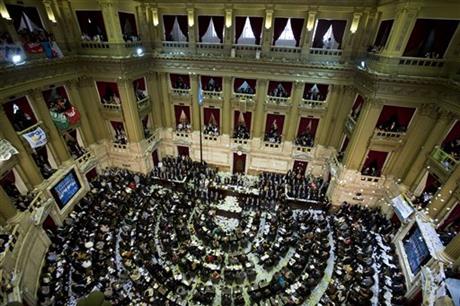
FILE – In this March 1, 2013 file photo, lawmakers attend the inauguration of the new legislative session at Congress in Buenos Aires, Argentina. Argentina’s Congress approved a plan late Wednesday, Sept. 11, 2013 to swap new bonds for defaulted debt rather than comply with U.S. court orders to pay investors cash in full plus interest. (AP Photo/Victor R. Caivano, File)
BUENOS AIRES, Argentina (AP) — Argentina’s Congress has overwhelmingly approved a plan to swap new bonds for defaulted debt rather than comply with U.S. court orders to pay investors cash in full plus interest.
Wednesday night’s vote sets up a direct challenge of the U.S. judiciary only days before Supreme Court justices in Washington are to decide whether to hear an appeal from President Cristina Fernandez.
If Argentina loses, it could face similar demands from investors left holding billions of dollars in other debts unpaid since the country’s economy crashed in 2001. And if Fernandez keeps refusing to pay the plaintiffs, the US courts could stop payment to the 92 percent of other creditors who accepted Argentina’s previous debt swaps.
That would push Argentina into another default and cause serious harm to an already shaky economy.
“It is a national cause that requires us to find unity across different parties,” ruling party congressman Carlos Heller said.
Argentina defaulted on a world-record $100 billion in foreign debt in 2001, and lawmakers said before approving the new measure that this third debt swap should show the world that the government is willing to pay what it should, as long as it doesn’t damage the economy.
The new swap, which will begin to take shape once the law is passed in the Official Bulletin, specifies that the bondholders which accept it will not receive a better offer than the one they offered in 2010.
Opposition members who supported the government in the vote nonetheless criticized it for failing to take action before suffering various setbacks from the U.S. justice system. The conservative Federico Pinedo said that the recent U.S. appellate court ruling in favor of the creditors who are suing Argentina happened because the government acted with “bravado and a lack of professionalism.”
“If the matter is being debated in Congress. it is because we are in the middle of a major failure,” he said.



